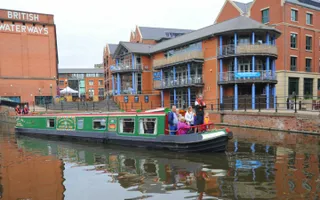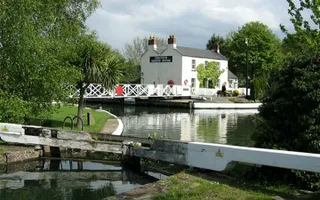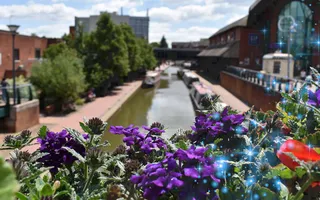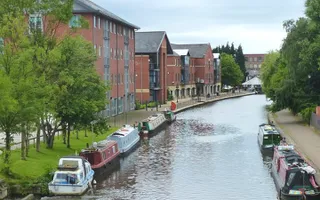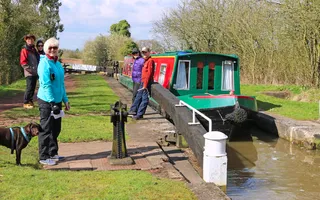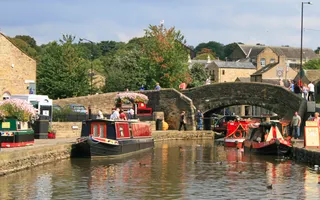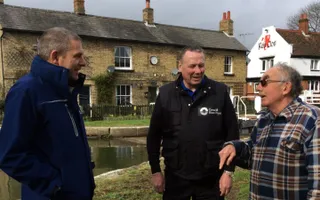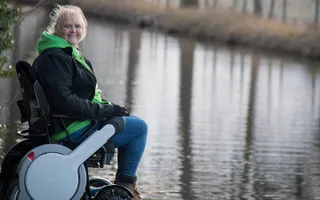Boating on our canals and rivers with a physical or mental impairment can present a whole set of different challenges, such as accessibility and boat handling. We're also very aware that it can make it hard to continuously cruise or move your boat in line with our boat licence terms and conditions.
Disabled boaters’ information
Everyone is entitled to use and enjoy our waterways and take advantage of all the happiness and wellbeing benefits that come with a life on water.
Disabled Boater Forums
We hold forums every three months, to hear your views on the issues you encounter, and to let you know what we are doing to help improve your boating experience. Most of them take place online.
Contact us if you want to receive notice of these meetings, or check our meetings page for the Eventbrite link to book your place. These forums also appear on the IWAF (Inland Waterways Accessibility Forum) page on Facebook – a place where discussions relating to disability and boating can take place. We welcome your questions and suggested topics for discussion, which you can submit in advance or bring to the meeting.
A British Sign Language (BSL) interpreter can be provided at the Disabled Boater Forum online meetings, if you let us know at least one week in advance.
Meeting dates for 2026 are:
- 18 February 4-5:30 p.m. (online)
- May (in person, details to be confirmed)
- 9 September 6-7:30 p.m. (online)
- 18 November 4-5:30 p.m. (online)
Equality: making sure everyone can access and enjoy the waterways
The Trust has an equality policy that, under the Equality Act 2010, sets out our approach to making sure everyone can access and use our waterways. We've got a specific process for making ‘reasonable adjustments' to our normal cruising regulations for disabled boaters and people with protected characteristics.
These include, but are not limited to:
- How we deliver our services
- What physical adjustments we may make to our facilities
- How we may make reasonable adjustments for disabled boaters without a home mooring
- Other provisions we may make for boaters without home moorings
- How we will review and monitor cases
Contact us first
If you find yourself struggling with accessibility and/or think you have a protected characteristic, first and foremost, talk to us. Your first point of call is the licence, compliance and enforcement team.
How to request any ‘reasonable adjustments' to your boat licence
Please complete our equality questionnaire.
It may seem like there are a lot of questions on this form but it's important to tell us about your physical and mental health, cognitive and intellectual difficulties, and how these affect your ability to use your boat. The more our team know about the issues you face, the more we can find ways to help you to continue to use and enjoy your boat.
Please read our our FAQs below before downloading our equality questionnaire.
If you are not able to complete the questionnaire using the PDF version, for example because you use a screen reader, please contact the licence, compliance and enforcement team to request a Word format document.
Wide beam boat surcharge
If you require a wide beam boat because of a disability then you may be exempt from the wide beam licence surcharge.
When you purchase or renew your licence you can select the exemption option. Detail of why a wide beam boat is needed should be provided and you need to upload documentation in support of your request for the surcharge to be waived. This could be details of your diagnosis, medical reports etc. Please note that sick notes, prescriptions, or GP appointments are not sufficient.
Failure to upload any supporting documentation or insufficient information will mean that your licence cannot be processed or may be delayed.
FAQs
What do you mean by disability?
'Disability' is defined in the Equality Act 2010 as a physical or mental impairment, which has a substantial and long-term adverse effect on a person's ability to carry out normal day-to-day activities. An impairment is 'long-term' if it has lasted for at least 12 months, it's likely to last for a least 12 months, or it is likely to last for the rest of a person's life.
Why do I have to fill out a questionnaire?
It's vital you tell us as much information as possible to help us give you the right adjustments. We can only support you if we know what's causing you difficulties. Your information may also highlight where you need extra support and/or benefits. Sometimes, we can put you in touch with other agencies who can help too.
Do I need to fill it all in?
Please fill in as much of the form as you can. The more information you provide, the more we're able to make the best adjustment for your circumstances. If a section of the form isn't relevant to you, just mark it as ‘not applicable' or ‘n/a'.
Is it going to cost me money to send in, and is my information secure?
No, prepaid postage envelopes come with every questionnaire.
They're returned to a central office, so our team can deal with them confidentially. Once we receive them, your documents are scanned to a secure location with restricted access, and the originals returned to you by tracked post as soon as possible. We review the personal data we hold on a regular basis. If we conclude that certain personal data is no longer needed, that personal data will be destroyed.
You can read more about this in our privacy policy.
Who's reviewing my information?
All information is reviewed centrally and in strictest confidence by an independent internal group, which may include welfare, boating, and legal colleagues.
It's important to give you the right support for your situation. To do that, we need to know how affects you so we, sometimes with independent experts' advice, can make appropriate adjustments. We do not question your diagnosis, but we need to know how it affects your ability to cruise.
You list a lot of medical documents, do I have to send them all in?
No, we've included a list to help you identify the types of documents that help us, but we realise you may not have all of them, and it's up to you which ones you share with us. However, we need enough information to confirm the disability you have and any details about how this affects you.
Will you pay my costs to get the medical evidence?
No, we're only asking you to fill out the questionnaire and supply copies of information you already have. If we do go on to ask for more specific information, and it costs you money, we'll pay the (reasonable) cost of this.
Why are you asking me about things not related to my use of the waterways?
We're trying to get a full picture of your general routine and what adjustments could help you. Everything we're asking - whether it's about your daily routine, work and study, or transport - is about us getting an understanding of your disabilities and the support you need to carry out your daily activities, and how we can help with that.
Why do you ask about benefits?
Some benefits already have a medical requirement you need to have fulfilled, so we don't want to reinvent the wheel by asking you for information twice. However, a request for a reasonable adjustment is different in every case so we do still need you to provide the rest of the information so that we can consider your request properly. There may also be other benefits you are entitled to that you might not be getting yet (such as housing benefit for your licence) and the questionnaire can flag these up. See our support page for organisations offering support advice.
I have a blue badge which confirms I have a disability, why do I still need to fill in the questionnaire?
The blue badge doesn't necessarily demonstrate that you will have difficulties with meeting the continuous cruising requirements - it can be awarded for a variety of circumstances. We review all requests for reasonable adjustments on an individual basis depending on your circumstances, including where you are on the network, so we need to have the information we've asked for in the questionnaire to do this fairly.
Can I notify you when I buy my licence if there is a disabled boater on board, even if I don't want any adjustments?
We've given a lot of consideration to this question, but under the general data protection regulations (GDPR), we can only hold information about a boater if there is a need to hold that information.
If you request an equalities adjustment because you're disabled or need some other specific help, then it would be valid for us to hold information like this so that we can help you. However, if a disabled boater hasn't requested or doesn't want any reasonable adjustment or help, there would be no valid reason for us to hold this information.
Why do you need to know the relationship I have with the person helping me with my request?
We're asking if this person is a professional support worker, a friend or relative so we can tailor our communication with them appropriately.
Would you consider ‘respite moorings' for disabled boaters who may need to moor for a longer period?
We already can and do provide adjustments for disabled boaters who may need to moor for a longer period. However, we always try to make adjustments that meet the needs of the individual boater, as each individual might have specific needs for their disability.
If a disabled boater needs to moor for a longer period, we can agree a mooring location that meets the boater's needs. Setting up many fixed location ‘respite moorings' would not be practical and wouldn't be as flexible as agreeing a mooring location that works for the individual disabled boater.
Can you provide disabled parking spaces close to canal access points/at moorings?
Where we have existing car parks, such as at museums and large attractions, we already provide disabled parking spaces. Unfortunately, in most places we don't own much land beyond the towpath and we don't have the power to create parking spaces on other people's land. However, we're always happy to work with partner organisations to look at improving access wherever we can.
What help can you provide for boaters without a fixed abode to help them access facilities such as local healthcare centres and local authority recycling centres?
The NHS website states that 'if you do not have a permanent address you can still register using a temporary address or the address of the GP surgery'. However, in practice, many surgeries only accept new patients who live within their geographical area. There is useful advice on the NHS website and the Friends, Families and Travellers website.
Our welfare team is working with a number of Healthwatch groups to promote and push for easier access for boaters to GPs and other health services.
Will I have to fill this questionnaire in every year?
No. We have a simplified process to ask you about what, if anything, has changed in the last year and how the current adjustment is working for you. We will ask you to fill in the full questionnaire every two years to ensure that the information we hold about you is accurate and up to date.
Last Edited: 15 December 2025


Stay connected
Sign up to our newsletter and discover how we protect canals and help nature thrive


